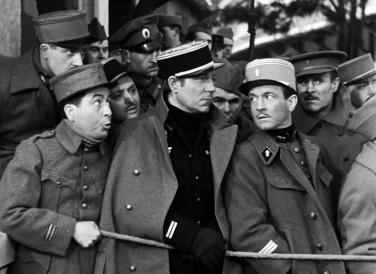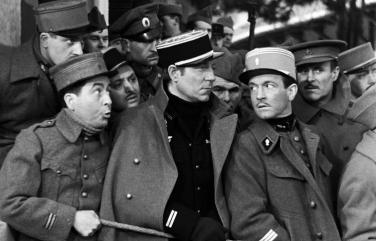

19:00, Presentation talk by Santos Zunzunegui
20:00, La grande illusion (La gran ilusión), Jean Renoir, France, 1938, 114', DCP, OV FR, Sub. ES
[Overture: Andante moderato]
De Boïeldieu (Pierre Fresnay), an aristocrat and career officer, and Maréchal (Jean Gabin), previously a mechanic and now a lieutenant in the French army, are shot down during a photographic reconnaissance mission across enemy lines during the First World War and taken to a German air base. Captain von Rauffenstein (Erich von Stroheim. Perhaps the aviator responsible for their capture?) greets them with extraordinary courtesy—extending his enemies an “enchanté”— and invites them to share his officers’ meagre rations. After their meal, De Boïeldieu and Maréchal are taken to a prisoner-of-war camp for allied officers in the German interior.
[Halbach: Allegro ma non troppo-Andante maestoso-Allegro assai vivace-Tempo I]
On arrival the two officers receive lodging in a small ‘commune’, a sort of microcosmos within the camp which brings together a colourful group of French prisoners: an engineer (Gaston Modot), a teacher (Jean Dasté), an actor (Cartier, played by Julien Carette) and the son of a wealthy family of Jewish bankers (Rosenthal, played by Marcel Dalio). The daily routine in camp consists of putting together—with spectacular (mainly feminine) props which Rosenthal has sourced from his couturier friends in Paris—a musical performance in which the captive English soldiers also take part. The work is somewhat different at night: for months now, the four officers mentioned above have been building an escape tunnel. Maréchal and De Boïeldieu enthusiastically join the group under the premise that a prisoner’s overriding duty is to escape.
A few days before the performance, news arrives from the Verdun front that German troops have taken Fort Douaumont, one of the crucial points along the French line of defence. The French prisoners decide not to lose heart and instead invite the camp leaders to the premiere of their vaudeville musical.
The performance is given to an audience of French and English prisoners and the German authorities. They laugh at the English soldiers magnificently disguised as women on Cartier’s wonderful stage. A message arrives backstage just as the performance is reaching its climax. Maréchal bursts onto the stage and says to the audience: “We’ve taken back Douaumont”. An English officer dressed as a woman removes his wig and says to the nearby musicians: “The Marseillaise, please”. The prisoners all sing together in the packed-out improvised theatre.
As a result, Maréchal is sentenced to forty-five days in solitary confinement. A German soldier takes pity on him and sneaks him tobacco and a harmonica to relieve his solitude.
When he rejoins his comrades, he is greeted with the news that the tunnel is ready. Escape is imminent. But then an unexpected transfer order arrives. During their transport beyond the camp they encounter a group of English prisoners destined to be the camp’s new occupants. The language barrier prevents Maréchal from telling the new arrivals about the escape tunnel.
[Wintersborn: Andante maestoso-Poco adagio]
After much to-ing and fro-ing between several camps and a series of failed escape attempts, De Boïeldieu and Maréchal (now separated from their old comrades) reach a new camp in an old castle in the German interior, far from any neutral border. There, they have a double encounter: their old comrade Rosenthal, and the (now) Major von Rauffenstein, who is out of active service on account of war injuries. He now runs the prisoner-of-war camp. The relationship between the two aristocrats De Boïeldieu and von Rauffenstein soon grows closer (in Renoir’s words: “I feel that this friendship between the German and the Frenchman is a type of love story”). However, the differences in how both men confront their future become evident. When von Rauffenstein claims that the end of the hostilities will also bring the end of their class, De Boïeldieu responds by saying that “We’re already unnecessary.” To which the German officer replies: “Don’t you think it’s a shame?” De Boïeldieu closes the dialogue with an ambiguous “Perhaps”.
In the meantime, De Boïeldieu convinces Maréchal and Rosenthal that they must escape by using one of their manoeuvres to draw the attention of the garrison. They skip the evening roll call and, following a ‘serenade’ arranged by all the prisoners in the castle, they discover the French officer at the top of the building playing the children’s song “Il était un petit navire” on a flute. He ignores von Rauffenstein’s demands to stop what he’s doing. Von Rauffenstein shoots him and wounds his abdomen. De Boïeldieu dies in the arms of his German friend, who he tries to console by reminding him that “Whether German or French, duty is duty”. Meanwhile, Rosenthal and Maréchal take advantage of the confusion to sneak out of the castle walls.
[La granja de Elsa: Adagio cantabile]
So begins the fugitive’s long and uncertain journey towards the Swiss border. They soon face a crisis when Rosenthal’s wounded leg prevents him from going on. Maréchal lets go of his antisemitism (“You’re a dead weight… I could never stand the Jews”), distancing himself from his comrade who bursts into a rendition of “Il était un petit navire” (the song that accompanied De Boïeldieu’s death). Maréchal starts singing the same song until it slowly fades on his lips. We see a distressed Rosenthal sat on a rock, then suddenly, to the right of the shot, Maréchal’s coat emerges. He has returned to help his comrade.
They take shelter in a farm stable and are soon discovered and offered food and shelter by its owner (Dita Parlo), Elsa. She shows the Frenchmen photos of her husband and her three brothers who died in battles which she calls “our greatest victories”. While Rosenthal regains his health, Maréchal helps Elsa with the daily work on the farm and looks after her young daughter Lotte. A linguistic exchange reflects the love between them: Maréchal learns German (“Lotte hat blaue Augen”), and Lotte French (“le café est prêt”).
The time soon comes to part. Maréchal promises Elsa that he’ll come back for her after the war. In the doorway, on the night of their departure, Maréchal repeats the words he said to Elsa’s young daughter (“Lotte hat blaue Augen”). Elsa, her eyes filled with tears, corrects his pronunciation once more.
[Finale: Poco allegro]
The two fugitives walk through the snow. They pause at the edge of a small wood before entering open ground. Maréchal asks Rosenthal to check the map to make sure that what they see in the distance is Switzerland. The answer is yes (“You can’t see a border. They’re an invention of man. Nature doesn’t give a damn”). A German patrol spots them and prepares to fire but their leader stops them: “Don’t shoot. They're in Switzerland.” The final shot shows both men as tiny dots in the snow-covered countryside, walking towards freedom.
Santos Zunzunegui
De Boïeldieu (Pierre Fresnay), an aristocrat and career officer, and Maréchal (Jean Gabin), previously a mechanic and now a lieutenant in the French army, are shot down during a photographic reconnaissance mission across enemy lines.
